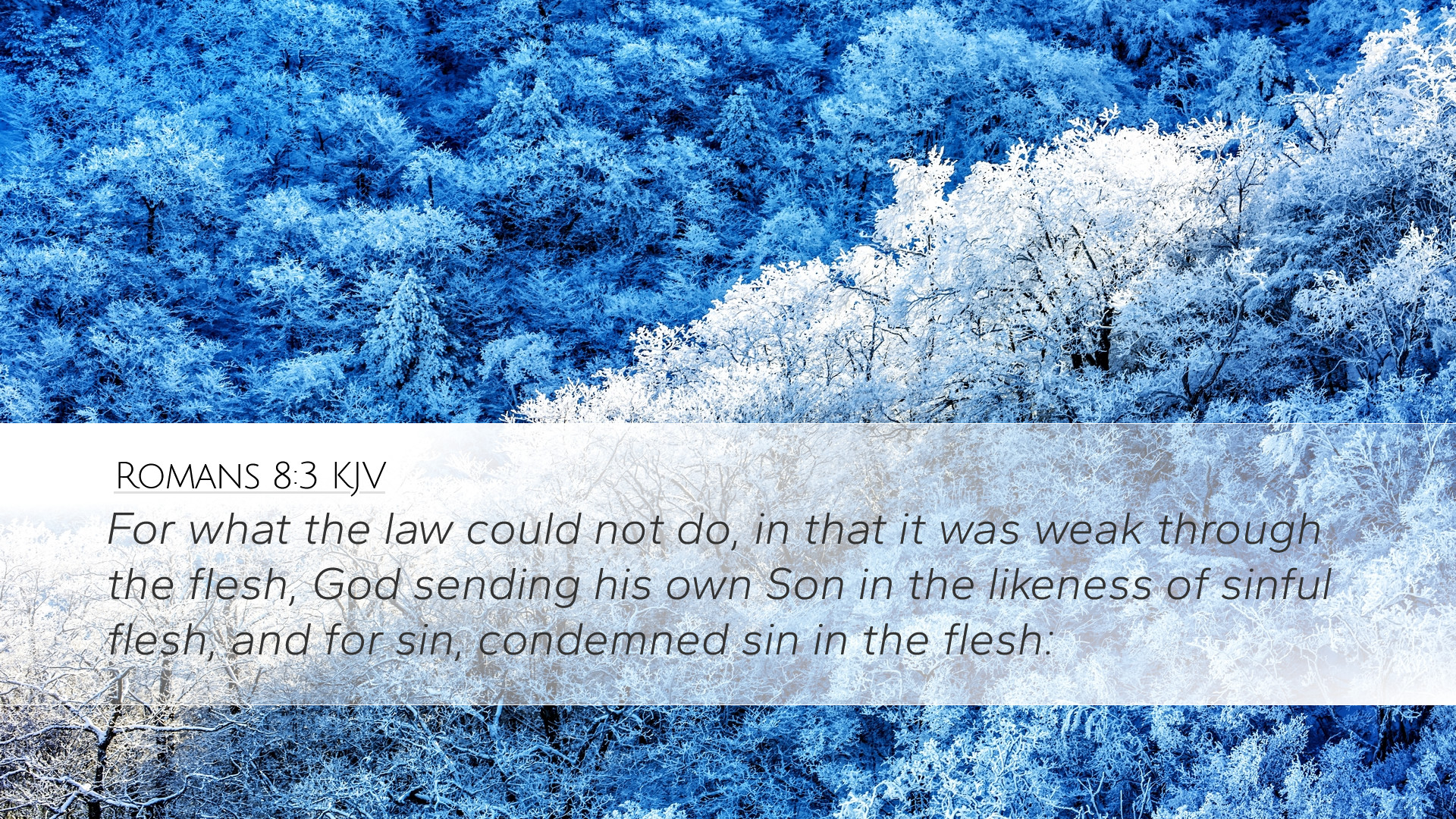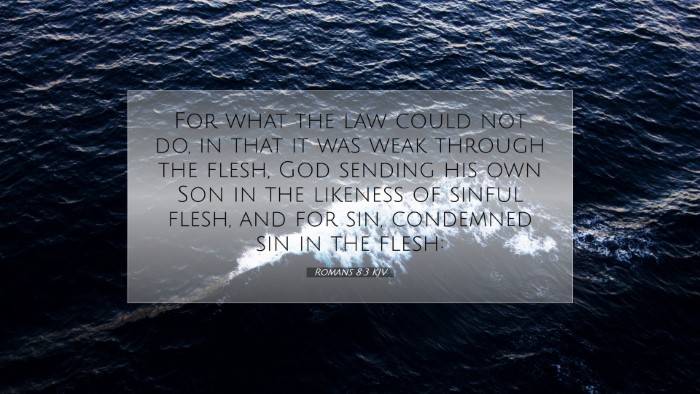Commentary on Romans 8:3
Romans 8:3 (KJV): "For what the law could not do, in that it was weak through the flesh, God sending his own Son in the likeness of sinful flesh, and for sin, condemned sin in the flesh."
Introduction
The Apostle Paul's epistle to the Romans stands as a cornerstone of Christian doctrine, particularly in its exposition of the concepts of sin, grace, and salvation. Romans 8:3 succinctly encapsulates the theological heart of this letter, addressing the limitations of the Mosaic Law and the transformative power of Christ’s redemptive work. Commentators such as Matthew Henry, Albert Barnes, and Adam Clarke provide valuable insights into this profound verse, which reveals both the incapacity of the law and the grace found in Christ.
The Weakness of the Law
Matthew Henry emphasizes that the law, in itself, is not weak but is rendered ineffective by human sinfulness. The law serves to reveal sin but lacks the power to redeem. Henry notes that the law was given with good intentions; however, it could not help those who were enslaved by their sinful nature. Thus, it is crucial to understand that the purpose of the law was never to make humanity righteous but rather to point to its need for salvation.
Albert Barnes adds that the phrase "weak through the flesh" highlights the inherent sinfulness of humanity that prevents adherence to the law. Barnes articulates that the law demands perfection, yet human weakness results in failure, leading to condemnation rather than salvation. This scenario made the necessity of divine intervention paramount.
The Divine Intervention
Adam Clarke expounds on the significance of "God sending his own Son". This action demonstrates God’s proactive love and desire to save humanity. Clarke emphasizes that God’s incarnation in the likeness of sinful flesh indicates the relatability of Christ to human suffering and temptation. This manifestation is not merely symbolic but serves to fulfill the law's requirements in a way humanity could not.
Condemnation of Sin
The latter part of the verse, "and for sin, condemned sin in the flesh," is pivotal. Henry states that Christ didn’t just bear the consequences of sin but actively condemned sin itself. This condemnation signifies a dramatic shift in the spiritual realm, wherein Christ's sacrificial act dismantles the power of sin over humanity. Henry notes that in Christ’s flesh, the authority of sin is defeated, providing believers the means to live in righteousness.
Barnes echoes this sentiment, affirming that the sacrifice of Christ represents a fulfillment of the law's penalties and a means by which believers can escape condemnation, thanks to His righteousness attributed to them. Barnes highlights that understanding Christ’s condemnation of sin is essential for grasping the totality of the gospel message, where grace supersedes judgement.
Theological Implications
This verse carries profound theological implications that resonate with the themes of justification, sanctification, and glorification. Clarke points out that this means believers are released from the law’s requirements through faith in Christ. They are now called to live according to the Spirit, a transformative process that leads to moral and spiritual renewal.
This concept indicates a shift from a works-oriented approach to a grace-oriented one. Henry articulates that this grace is not a license to sin but a profound empowerment to pursue holiness, grounded in the believer’s identity in Christ. The key takeaway is that the law remains a guide, but it is not the means of salvation.
Concluding Thoughts
Romans 8:3 serves as a powerful message of hope and transformation for Christians. Through the insights of respected commentators, we see that while the law reveals our shortcomings, it is through Christ that we find grace and empowerment for a new life. Barnes concludes that every believer should embrace this truth: that through the sacrifice of Christ, sin has been condemned, and believers are enabled to walk in newness of life.
This verse not only reassures us of our standing in Christ but also challenges us to reflect the righteousness and holiness of God in our daily lives. As pastors, students, theologians, and scholars reflect on this passage, it is vital to appreciate the depth of God's plan of salvation as triumphed through Christ.


